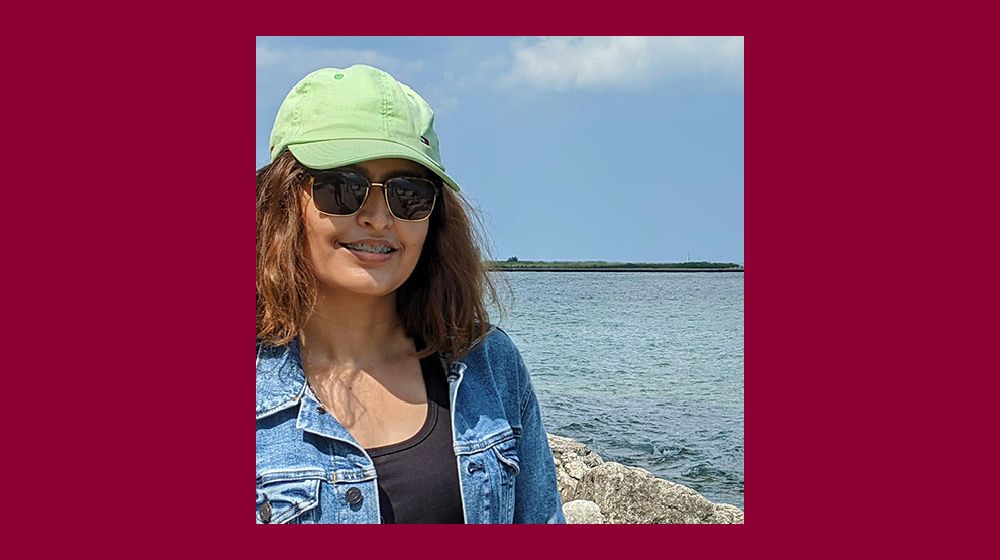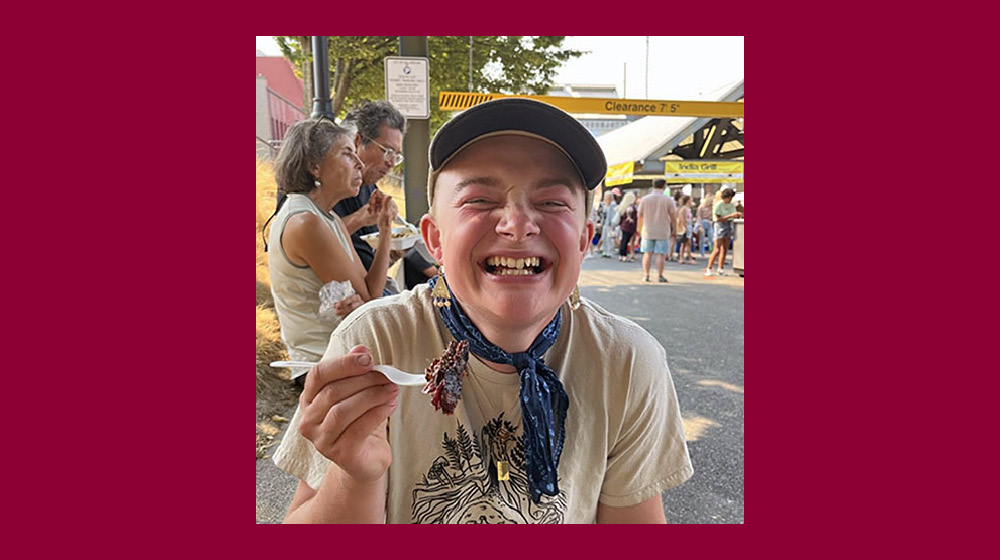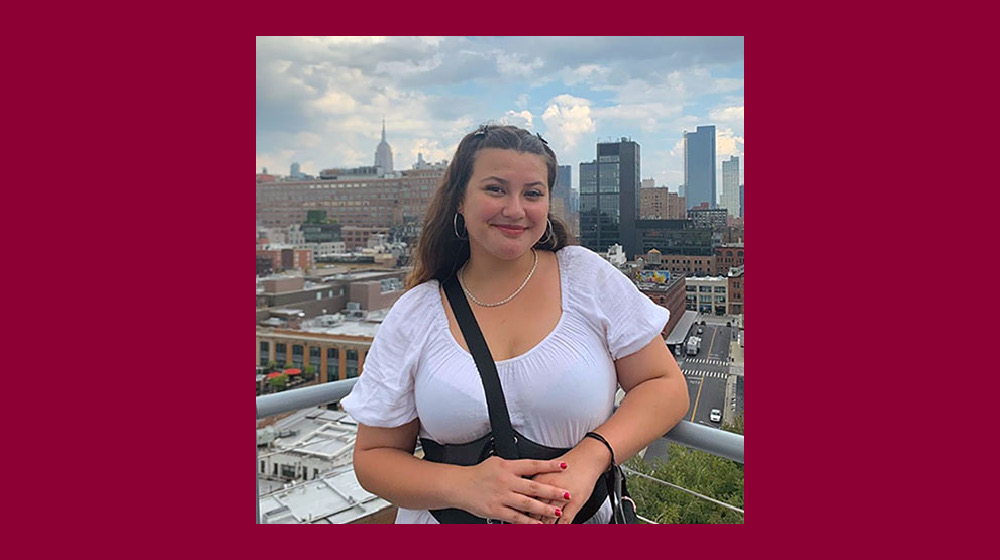Food-Justice-student-research
SES Students Study Food Justice in the Chicago Region
The food justice movement aims to ensure the right of all people across economic, cultural, and racial backgrounds to grow, sell, and eat nutritious, affordable, culturally appropriate, and sustainably produced food. In SES, Tania Schusler, PhD, investigates how environmental sustainability intersects with racial and economic justice. Several of her students have engaged in research, described below, that aims to contribute to a more just food system.

Dikshya Dahal's research addresses how organizations can prioritize local food systems during disasters.
Dikshya Dahal
Dikshya Dahal received her undergraduate and master’s degrees in environmental management from Kathmandu University in Nepal. After working with nonprofit organizations on community projects, Dikshya wanted to pursue a degree that combined her environmental science background with her community-based experience. She reached out to Schusler and, in 2021, began her master’s thesis focused on food justice. Dikshya’s research identifies how organizations responding to pandemic disruptions are promoting racial and economic equity in the food system.
Dikshya collaborates with the Chicago Region Food System Fund (CRFSF), which launched in 2020 to address hunger and business disruptions caused by the COVID-19 pandemic. The CRFSF has distributed grants to numerous nonprofit organizations, most led by people of color and working in communities of color disproportionately impacted by the pandemic.
Grant recipients submitted reports to CRFSF sharing stories about their work to meet community food needs, the challenges they experienced, and the strategies they adopted to overcome those challenges. Dikshya analyzed 120 of these reports. She also conducted focus group discussions with representatives from 20 organizations, and she conducted social network analysis using ORA software to study interactions among organizations responding to pandemic impacts.
Dikshya found that organizations faced difficulties producing and distributing fresh produce during the pandemic. Many other operational and logistical challenges also arose due to COVID-19 restrictions and safety considerations. In response, the organizations used more outdoor spaces, promoted more local food production and distribution, creatively staffed programs, and shared resources. Partnerships were essential to navigating the pandemic. “These organizations realized that partnerships help them to interact and share their resources,” Dikshya explained.
“Food insecurity was one of the most significant emerging issues after the pandemic began,” Dikshya said. “I feel like I can give back to the community through my interdisciplinary research.” Dikshya’s thesis addresses how organizations can prioritize local food systems during disasters like the pandemic and sheds light on the importance of partnerships and the ability of organizations to adapt.

Frankie Rafferty studied the COVID-19 pandemic's impacts on students' food security.
Frankie Rafferty
When Frankie Rafferty was an undergraduate student, they worked as a resident assistant, so their housing and food depended on their job. When the pandemic hit, they lost access to both. “I was experiencing food insecurity, which I hadn’t experienced while living on my own before,” Frankie said. This frustration inspired them and former SES professor Mariana Valencia-Mestre to conduct research that addresses COVID-19’s impact on students’ food security. Schusler later joined their team.
After creating a literature review on previous research regarding food insecurity and college students, Frankie designed a survey to assess Loyola students’ food security and related factors before and after the pandemic hit. They collected data including student identities, GPAs, and housing and food circumstances. Frankie wanted to answer the big question: Did the pandemic change students’ food security?
Nearly 30% of the 253 respondents reported becoming less food secure during the pandemic. The overall food insecurity rate among respondents increased by almost 131%. “A change in a student’s food security status was associated with their household income. It also was related to an individual or a family member’s loss of employment due to the pandemic,” Frankie said. Among other areas, race, ethnicity, first-generation status, sexual orientation, and spring 2020 GPA were associated with changes in a student’s change in food security.
“This research is important because it’s indicative of how the pandemic is affecting various areas of students’ lives. It is evidence for governments and universities to increase their efforts to support students in achieving food security,” Frankie explained. “This research also speaks to the food security disparities that existed before the pandemic and are associated with diverse and intersecting identities.”
Frankie graduated from Loyola in 2021 with a bachelor’s degree in environmental policy and a minor in Catholic studies. They now work as a food systems specialist Americorp Fellow at the Kitsap Conservation District in Washington. Their research appears in the Journal of Agriculture, Food Systems, and Community Development.

Rowan Obach's food justice research started as a class project in the SES Solutions to Environmental Problems course.
Rowan Obach
Rowan Obach graduated from SES in 2023 with a degree in environmental policy. In her sophomore year, she enrolled in the Solutions to Environmental Problems (STEP): Food Systems course taught by Assistant Professor Tania Schusler.
“I’ve always been a foodie, and I love trying different types of foods, so I thought it would be interesting to do research related to that,” Rowan said.
The STEP course encouraged students to collaborate with an external organization. Rowan and two peers partnered with the Chicago Food Policy Action Council (CFPAC) to evaluate their COVID-19 Rapid Response effort. Rapid Response created a virtual space to discuss solutions and share resources to address food insecurity, supply chain disruptions, and other pandemic impacts on the Chicagoland food system.
Through interviews with CFPAC staff members, Rowan and her peers documented how people came together in response to COVID-19 impacts. Rowan then continued this research beyond the STEP class through a fellowship from the Loyola Undergraduate Research Opportunities Program. Rowan extended the interviews to include non-staff participants in the Rapid Response effort. She also collected data on the interviewees’ racial and ethnic backgrounds to explore how people’s experiences of the Rapid Response space varied across social identities.
Rowan identified emergent themes across the interviews. She found that network connections are important for improving food system resilience to shocks like COVID-19. Connections enabled people to set priorities, share resources, and coordinate actions like distributing food and PPE or advocating for government response programs to support small businesses and farmers of color.
Rowan’s data about racial backgrounds revealed varying comfort levels in the Rapid Response space among respondents. “Most white individuals told us that they were very comfortable in the space, while some non-white individuals said that this research and these collaborations can feel extractive, meaning that they are just getting information taken from them but aren’t included in terms of how they can benefit from that information,” Rowan explained. “My publication points to the need for a shift in mindset, especially in academic research, so that when you are interacting with communities, there is a give-and-take situation and not just an extraction of research.”
Rowan’s research helped inform CFPAC’s evolution of the Rapid Response effort into today’s Rhizome Network. Her research was published in March in the Journal of Agriculture, Food Systems, and Community Development. Find her work here.
Story by Alex Quebbeman
SES Students Study Food Justice in the Chicago Region
The food justice movement aims to ensure the right of all people across economic, cultural, and racial backgrounds to grow, sell, and eat nutritious, affordable, culturally appropriate, and sustainably produced food. In SES, Tania Schusler, PhD, investigates how environmental sustainability intersects with racial and economic justice. Several of her students have engaged in research, described below, that aims to contribute to a more just food system.
Dikshya Dahal
Dikshya Dahal received her undergraduate and master’s degrees in environmental management from Kathmandu University in Nepal. After working with nonprofit organizations on community projects, Dikshya wanted to pursue a degree that combined her environmental science background with her community-based experience. She reached out to Schusler and, in 2021, began her master’s thesis focused on food justice. Dikshya’s research identifies how organizations responding to pandemic disruptions are promoting racial and economic equity in the food system.
Dikshya collaborates with the Chicago Region Food System Fund (CRFSF), which launched in 2020 to address hunger and business disruptions caused by the COVID-19 pandemic. The CRFSF has distributed grants to numerous nonprofit organizations, most led by people of color and working in communities of color disproportionately impacted by the pandemic.
Grant recipients submitted reports to CRFSF sharing stories about their work to meet community food needs, the challenges they experienced, and the strategies they adopted to overcome those challenges. Dikshya analyzed 120 of these reports. She also conducted focus group discussions with representatives from 20 organizations, and she conducted social network analysis using ORA software to study interactions among organizations responding to pandemic impacts.
Dikshya found that organizations faced difficulties producing and distributing fresh produce during the pandemic. Many other operational and logistical challenges also arose due to COVID-19 restrictions and safety considerations. In response, the organizations used more outdoor spaces, promoted more local food production and distribution, creatively staffed programs, and shared resources. Partnerships were essential to navigating the pandemic. “These organizations realized that partnerships help them to interact and share their resources,” Dikshya explained.
“Food insecurity was one of the most significant emerging issues after the pandemic began,” Dikshya said. “I feel like I can give back to the community through my interdisciplinary research.” Dikshya’s thesis addresses how organizations can prioritize local food systems during disasters like the pandemic and sheds light on the importance of partnerships and the ability of organizations to adapt.
Frankie Rafferty
When Frankie Rafferty was an undergraduate student, they worked as a resident assistant, so their housing and food depended on their job. When the pandemic hit, they lost access to both. “I was experiencing food insecurity, which I hadn’t experienced while living on my own before,” Frankie said. This frustration inspired them and former SES professor Mariana Valencia-Mestre to conduct research that addresses COVID-19’s impact on students’ food security. Schusler later joined their team.
After creating a literature review on previous research regarding food insecurity and college students, Frankie designed a survey to assess Loyola students’ food security and related factors before and after the pandemic hit. They collected data including student identities, GPAs, and housing and food circumstances. Frankie wanted to answer the big question: Did the pandemic change students’ food security?
Nearly 30% of the 253 respondents reported becoming less food secure during the pandemic. The overall food insecurity rate among respondents increased by almost 131%. “A change in a student’s food security status was associated with their household income. It also was related to an individual or a family member’s loss of employment due to the pandemic,” Frankie said. Among other areas, race, ethnicity, first-generation status, sexual orientation, and spring 2020 GPA were associated with changes in a student’s change in food security.
“This research is important because it’s indicative of how the pandemic is affecting various areas of students’ lives. It is evidence for governments and universities to increase their efforts to support students in achieving food security,” Frankie explained. “This research also speaks to the food security disparities that existed before the pandemic and are associated with diverse and intersecting identities.”
Frankie graduated from Loyola in 2021 with a bachelor’s degree in environmental policy and a minor in Catholic studies. They now work as a food systems specialist Americorp Fellow at the Kitsap Conservation District in Washington. Their research appears in the Journal of Agriculture, Food Systems, and Community Development.
Rowan Obach
Rowan Obach graduated from SES in 2023 with a degree in environmental policy. In her sophomore year, she enrolled in the Solutions to Environmental Problems (STEP): Food Systems course taught by Assistant Professor Tania Schusler.
“I’ve always been a foodie, and I love trying different types of foods, so I thought it would be interesting to do research related to that,” Rowan said.
The STEP course encouraged students to collaborate with an external organization. Rowan and two peers partnered with the Chicago Food Policy Action Council (CFPAC) to evaluate their COVID-19 Rapid Response effort. Rapid Response created a virtual space to discuss solutions and share resources to address food insecurity, supply chain disruptions, and other pandemic impacts on the Chicagoland food system.
Through interviews with CFPAC staff members, Rowan and her peers documented how people came together in response to COVID-19 impacts. Rowan then continued this research beyond the STEP class through a fellowship from the Loyola Undergraduate Research Opportunities Program. Rowan extended the interviews to include non-staff participants in the Rapid Response effort. She also collected data on the interviewees’ racial and ethnic backgrounds to explore how people’s experiences of the Rapid Response space varied across social identities.
Rowan identified emergent themes across the interviews. She found that network connections are important for improving food system resilience to shocks like COVID-19. Connections enabled people to set priorities, share resources, and coordinate actions like distributing food and PPE or advocating for government response programs to support small businesses and farmers of color.
Rowan’s data about racial backgrounds revealed varying comfort levels in the Rapid Response space among respondents. “Most white individuals told us that they were very comfortable in the space, while some non-white individuals said that this research and these collaborations can feel extractive, meaning that they are just getting information taken from them but aren’t included in terms of how they can benefit from that information,” Rowan explained. “My publication points to the need for a shift in mindset, especially in academic research, so that when you are interacting with communities, there is a give-and-take situation and not just an extraction of research.”
Rowan’s research helped inform CFPAC’s evolution of the Rapid Response effort into today’s Rhizome Network. Her research was published in March in the Journal of Agriculture, Food Systems, and Community Development. Find her work here.
Story by Alex Quebbeman
